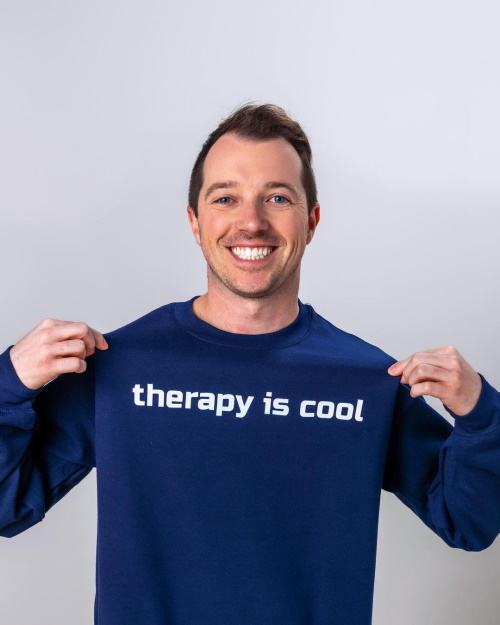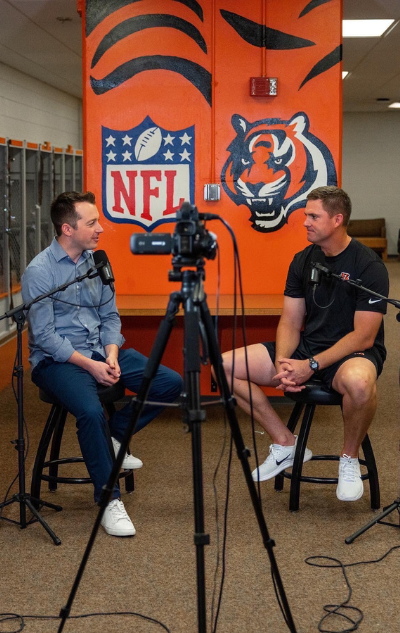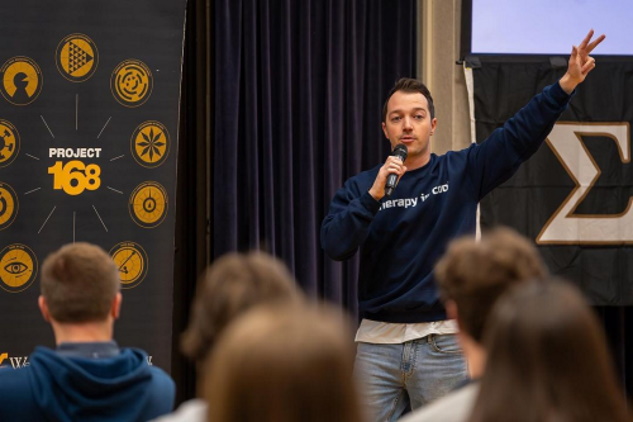Features
 Brandon Saho (West Virginia) barely remembers a time when anxiety and depression didn’t lurk in the corners of his mind, often surfacing in subtle hints and disruptions.
Brandon Saho (West Virginia) barely remembers a time when anxiety and depression didn’t lurk in the corners of his mind, often surfacing in subtle hints and disruptions.
Through years of focused therapy and self-awareness, Saho has developed strategies to support his mental health. His path forward is now focused on helping others on their own journey to health.
In 2021, Saho launched his podcast, "The Mental Game," to provide an honest and supportive space to discuss psychological struggles and help minimize the stigma of depression and anxiety.
He opens his platform to high-profile guests from across sports, music, and entertainment who candidly reveal their own mental health struggles. The episodes, Saho notes, help foster a sense of community and understanding for listeners facing similar challenges.
His long list of notable guests on “The Mental Game” include former NFL players Terry Crews, Ricky Williams and Chad “Ochocinco” Johnson, rapper Kevin Gates, “The Office” star Kate Flannery, and Zeta Omicron Chapter alumnus Jon Jones (North Texas) of Eli Young Band. The stories they relay of personal struggles prove mental health concerns have no boundaries, impacting every demographic segment – regardless of status, wealth or resources.
While mental health recovery is a personal journey, Saho knows the value of a strong support team for care and encouragement.
For Saho, his team consists of his family, along with his Gamma Pi Chapter brothers whose enduring friendships continue to support him today.
“I look back on my Sigma Nu experience and remember it was the one place where people really cared about me and how I was doing,” said Saho of brotherhood at West Virginia.
There were many times he was battling depression and suicidal thoughts – it was constant presence in his college years – but the fraternity was his safe space.
“The guys saw I was upset and knew something was going on,” Saho recalls. “They were always there for me…to talk to me or just to listen.”
He says fraternities have the reputation of football games and parties, but for Saho, the brothers of the Gamma Pi Chapter were his lifeline during dark days.
“Even today…ten years later…my best friends are the ones that I rushed with and talk to today,” he said. “We’re still connecting and rooting for each other.”
Daylight and darkness
Within a few years of graduating with a degree in Sports Broadcasting in 2015, Saho was living his childhood dream.
The lifelong sports fan and native Cincinnatian was on the sidelines in 2018 for the Bengals, reporting live for a national football audience and rubbing elbows with the stars of the game.
As a sports anchor and reporter for the city’s NBC station, Saho covered the gamut of local teams from the University of Cincinnati Bearcats to the Reds baseball team.
“I absolutely loved growing up in Cincinnati…thinking it was the biggest, baddest sports town in the country,” said Saho, who began his broadcast career in Columbus, Ga., and Baton Rouge, La., before landing in his hometown market.
On the surface, his life seemed ideal. But underneath the perfect façade, Saho was struggling for clarity. The anxiety and depression that was present most of his life was winning the battle.
“Growing up I had a great family, lots of friends, but this ‘alone’ feeling was always there,” said Saho, recalling the thoughts of suicide which tormented him from his early teens.
In high school, he managed the mental chaos through sports and the bond of teammates. At West Virginia, he found his home among his brothers in Sigma Nu after transferring from the University of Cincinnati.
Saho had not intended to pledge a fraternity, focusing instead on his degree and career path.
“But I just fell in love with the House and the group of guys I rushed with,” Saho said. “It was so cool to experience that bond of brotherhood and feel really welcomed right from the beginning.”
He was still juggling anxiety and depression with the demands of college, but being among his Sigma Nu brothers provided a crucial balance.
“This was a [decade] ago…therapy wasn’t a thing yet and we didn’t talk about mental health,” Saho said. “So I really leaned on my brothers at Sigma Nu Gamma Pi to get me through my toughest times.”
A national epidemic
 Saho is among the estimated 60 million people in the United States – roughly one in every five people - who suffers with mental illness, according to the National Institute of Mental Health.
Saho is among the estimated 60 million people in the United States – roughly one in every five people - who suffers with mental illness, according to the National Institute of Mental Health.
For the generation of young adults of college age amidst the COVID pandemic, the burden weighs even heavier. According to the World Health Organization (WHO), levels of anxiety and depression increased by nearly 25 percent for those under 25 during the pandemic.
Saho didn’t need scientific statistics to know he was among those at risk. He first contemplated suicide when he was 14. Over the years he’s lost count of how many times he perched on bridges willing himself to jump, taken pills and prayed he would not wake up, or laid down in busy traffic – jumping up in the nick of time.
But like the vast majority of those with mental health issues, Saho kept his demons private.
“I knew I always struggled with depression, anxiety and suicidal thoughts off and on throughout my life,” he said. “But no one really on the outside knew how bad it was.”
It took admitting he had a problem beyond his control, accepting there was no magic pill to cure it, reaching out for lifelines and guidance, and talking to therapists for guidance before he was able to manage his mental health.
Stepping back from the edge
For Saho, the road to rock bottom began in late 2021, a year into the pandemic and the start of the Bengals path to Super Bowl LVI (56).
“I’m living my dream job, reporting on the Bengals – my childhood team – interviewing Joe Burrow and Jamar Chase every day,” Saho said. “I’m doing things kids are dreaming of.”
But behind the scenes, it was a nightmare. Over the course of the next three months, Saho lost three close family members – his grandmother, uncle, and a cousin who had been more of a brother to him. His relationship with the woman he thought he would marry fell apart.
“The Bengals won the AFC Championship, and during that three months of the playoff run I was suicidal every second of every day,” said Saho, recalling he drafted exit plans and wrote goodbye letters to loved ones during that dark period. “I had so much stuff going on behind the scenes that people didn't know.”
The one thing that stopped him from ending his life was the vision of what it would do to his family.
“The thought of my mom losing a child is what kept me holding on,” Saho said.
On St. Patrick’s Day in March 2022, at the urging of his mother, and unable to banish the thoughts of suicide from his mind, Saho checked himself into the hospital. He would remain there for the next few weeks, learning coping mechanisms and strategies to fight the demons.
“It’s not a quick fix…there’s no magic mirror to walk through and come out the other side happy and healed,” Saho admits. “But those two weeks gave me the tools in my toolbox to start a new path forward.”
Opening new doors
As he began to heal emotionally, Saho realized he was losing his single-minded passion for sports reporting, and gaining an interest in the mental health crisis. He saw an opportunity to blend the two topics.
“And so I quit my job in August of 2020 and launched The Mental Game podcast in November,” Saho said. “I was amazed there wasn't anything that existed like it before.”
Today, The Mental Game podcast has thousands of subscribers and a growing list of celebrities and sports stars wanting to share their stories. Saho recently wrapped up a successful live tour of The Mental Game podcast, traveling across 30 states over 30 days, presenting in assemblies, high schools, colleges, and theaters to bring his mental health message to tens of thousands of people.
“It was an absolutely incredible, wild experience to broadcast the podcast in front of live audiences,” Saho said, noting the third stop on the tour was at West Virginia University to visit the Gamma Pi Chapter of Sigma Nu.
Looking into the future, his goal is to become the biggest mental health podcast on the airwaves so that he can help as many people as possible. (And as far as his list of dream guests for the show, he lists President Barack Obama, Justin Bieber, and, of course, the sports world’s “it” couple Taylor Swift and Travis Kelce.)
Nearly two decades have passed since Saho took a 15-inch TV with a VCR built in and camcorder to a seventh-grade football game for his first live remote. While the equipment and the subjects have changed, he still has a passion to tell a story. Only now his story is to encourage others who need help to simply reach out.
“If people love and care about you they might not understand at first…they might not know how to help or say the right thing at first…but they want to help you, so let them,” Saho said.
